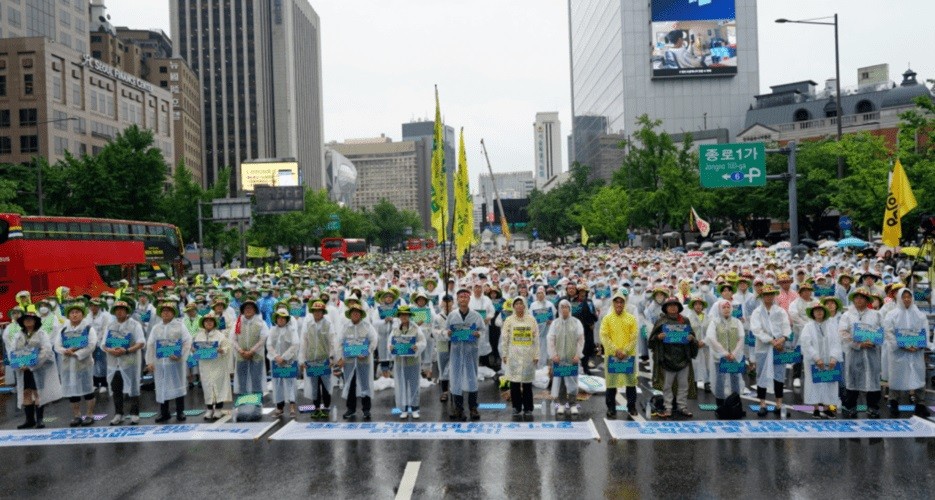
Massive strike in hospitals
The Network
The Korean Health and Medical Workers Union (KHMU) went on strike on Thursday July 13 and Friday July 14. The mobilization involved over 64,000 KHMU members from 127 branches across Korea. The strike began on July 13 with 45,000 determined KHMU members dressed in see-through raincoats, braving the pouring rain, to listen to President Na Sun-Ja speak. “We saved people's lives during the Covid-19 pandemic. But when Covid-19 ended, we were looked down upon,” she exclaimed.
The KHMU strike is taking place alongside a general strike initiative led by the Korean Confederation of Trade Unions (KCTU), which began in early July, but the government has called the KCTU and KHMU strikes illegal, saying their demands are "political".
President Na responded in her speech by saying, "If this is a political strike to demand that the high costs of people's health care be solved and that public hospitals that have saved people's lives are saved, then shouldn't this type of political strike take place? ”
The KHMU had first won an agreement in 2021 with the government to address the deteriorating working conditions faced by healthcare workers amid the Covid-19 pandemic.
Hospital strikes continue
The Korea Health and Medical Workers Union (KHMU), made up of around 45,000 nurses, caregivers and other members from 140 medical institutions across the country, ended its general strike on Friday. The strike was aimed at demanding better working conditions and increased state support for public medical institutions. Despite the end of a two-day general strike, some unionized medical workers in South Korea persist in their walkouts, causing disruptions in hospitals, as a number of workers have not yet reached an agreement with their management respectively, which led to the continuation of strikes.
Among the medical facilities affected by the ongoing strikes is Korea University Medical Center, the only major hospital in Seoul where workers and management have failed to reach an agreement. Pusan National University Hospital, the largest medical institution in the southern port city of Busan, is suffering a significant impact, with around 80% of its 3,500 unionized workers taking part in the walkout.
Striking medical workers are demanding better nursing and care services and the establishment of a 1:5 nurse-patient ratio. The union stressed that if agreements cannot be reached between hospitals and their management, the workers will not return to their posts. KHMU officials have declared their commitment to continue discussions with the Ministry of Health to improve the working conditions of medical personnel and expand public medical services.
Since Friday, the ministry and the union have held three rounds of meetings. They discussed potential measures to overcome these difficulties, seeking to find common ground that would lead to the resolution of the ongoing strikes.




